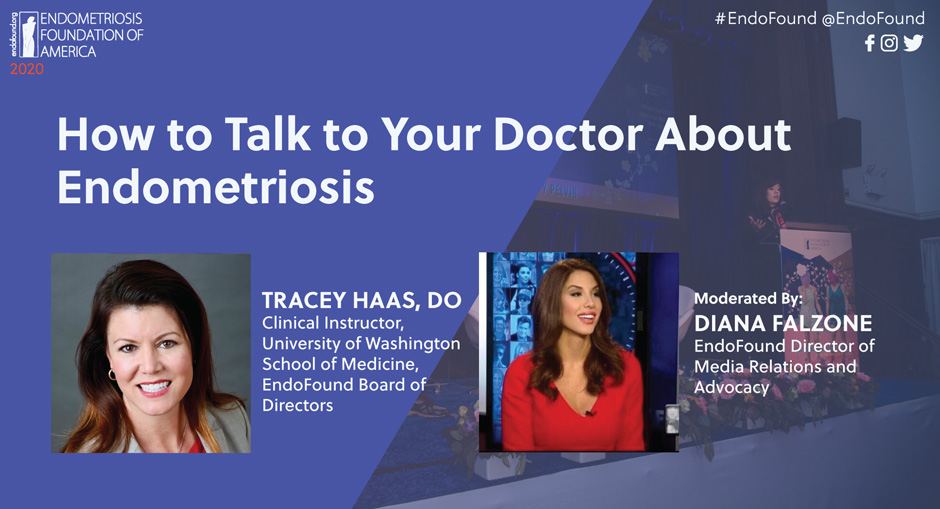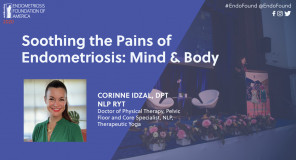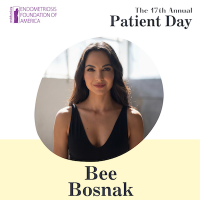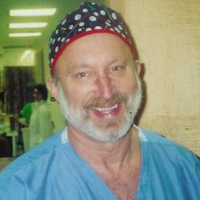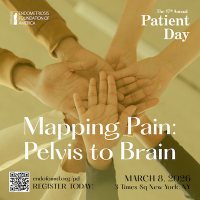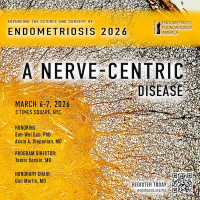Endometriosis Foundation of America
Virtual Patient Conference, October 16-18, 2020
How to talk to your doctor about Endometriosis - Tracey Haas, DO
Diana Falzone:
Now speaking of an awesome panelist, we have with us today, tonight, depending upon where you are right now, is Dr. Tracey Hass. She is a family physician, and she also has endometriosis. So has a keen understanding of what it's like to be on the other side, being a patient and also being a physician. So thank you so much for joining us today.
Dr. Tracey Hass:
Thank you, Diana. And I appreciate that. As you mentioned, I'm a family physician, I've been practicing for 16 years. I'm also a clinical instructor at University of Washington School of Medicine on campus here in Wyoming, so I get the opportunity to train and help teach. I hope this next generation of physicians so that they can be better at identifying and diagnosing endometriosis earlier.
As you mentioned, I am also an endometriosis patient and like you and like your story, thank you for sharing that earlier. I was also in my early thirties when I was first diagnosed with endometriosis, and that is not when I first started having symptoms. So just like so many women that you guys have already heard from today, it took 15 years from my first presentation at an emergency room with an emergent issue before I was finally diagnosed.
I was 17 years old when I first went to an ER with a torsion of my left ovary. I ended up having an emergency surgery and they said it was an ovarian cyst. Years later we learned that that was endometriosis. I was placed on birth control like so many of you were. 15 years of oral contraceptives and NuvaRing and continuous birth control and still had worsening symptoms despite all of that kind of standard of care for the time. I was 32 when I had an appendicitis or so we thought, and once I got opened up, there was "endometriosis everywhere by the general surgeon."
One of the issues that came out at that first surgery of mine that many of you may have experienced is that it was a general surgeon who found the endometriosis, but a general surgeon did not want to deal with it. They called the OBGYN into the room and said, "What do we do with this?" I can take off the appendix, but what about all of this? Scar tissue, adhesions, and obvious endometriomas throughout bowel and peritoneum as Dr. Seckin had outlined in pictures before earlier today. And so, they said, "Well, let's not do anything, but take out her appendix and start her on Lupron." Well, I didn't want to do that. Four years later, after struggling through trying acupuncture and lots of different dietary adjustments, I ended up having another surgery and ablation and then did start Lupron. At that point in my life, I had just gotten married and was placed on a medicine that put me into premature menopause that I ended up being on for 10 years, long time to be on Lupron, but that will be addressed at another time.
Three years later, I went on to develop my first bowel obstruction. I ended up having a big bowel resection surgery, and a year later, another ablation surgery, fibroid removal. Three years later, I was still quite miserable. And I said, "The problem I'm having, can't be addressed by a general surgeon and it can't only be addressed by an OBGYN." I really needed to find a team, a multidisciplinary team, and so many endometriosis patients do need that. And that's where I decided I would start advocating for myself first. And then once I figure out what to do, I would start advocating for patients.
I did a lot of research. I live in Wyoming. I did a lot of research to try to find the right physicians. I had a fantastic OBGYN who recommended I go to a surgeon down in Colorado. The issue was that it wasn't a multidisciplinary approach. I ended up finding, thank goodness, Endo Found, I was a huge Top Chef fan and ended up reading about Padma story and got connected with Dr. Seckin once I found out about Endo Found and about his approach using a multidisciplinary team, urologists, colorectal surgeon, and of course himself and Dr. Goldstein. So I was absolutely lucky to have gotten to travel to New York and get the definitive surgery done, 28 years after my first symptoms. I had 24 endometriomas excised. And literally the day after I was pain-free. I don't believe I even took any pain medicine after this six hour surgery, because it was the first time in years that I had been pain-free. So I am now today just a huge advocate for not just Dr. Seckin and Dr. Goldstein and Endo Found. I am on the board of Endo Found now, but more importantly, I really want to spread the word about endometriosis. What is it? How can we detect it early? How can we get treatment early? How can we get definitive treatment early? So that's kind of where I land today. In my practice I do try to diagnose this early on, but also I'm trying to get the word out with my students so that if you start to see unusual symptoms, this isn't just about being a painful period, this is so much more than that.
Diana Falzone:
Yes. I hate hearing stories like yours, stories that I personally can relate to. And I know so many watching and being with us today, Penn, it just makes you inferior rate it, that you had to go 20 some odd years feeling awful, feeling sick and feeling robbed of days, because it really does take days away, but am very happy to hear that you had that definitive surgery and that you are hopefully living pain-free now. And that's an aspiration for all of us dealing with endo, especially on a daily basis.
You, as I mentioned early on, have a very unique position, because you've been on both sides, you are a physician, you are an educator, but you also are a patient. So you have compassion and empathy that I've encountered doctors in the past, who just didn't. Sometimes general doctors who would chalk it up to, Oh, It's a bad period. Oh, you must have a thrill. Oh, you got a hormonal balance, bleed it out, whatever it might be. But when you finally do get into a room with a doctor, it can be incredibly intimidating. They're supposed to know everything. And here you are someone in distress, probably someone who's been going through debilitating pain at your worst. And you're looking for an answer. So what would you say to a woman who is having symptoms and she thinks they might be due to endo? How could she approach this with her doctor?
Dr. Tracey Hass:
That's such a great question. Thank you. And I have approached this from all different angles now, as being a patient who is intimidated while being a physician. I went to my colleague when I thought I was having an appendicitis. And she said, "Well, are you?" And I said, well, I don't know, I'm just in pain. And so what it really comes down to is having a great trust relationship with a doctor. And so if you can go to your primary care physician and start there and really feeling like there's trust, because this is a sensitive subject. That's something else I will talk about, is just the stigma of talking about periods and pain. Those are two stigmatized things and really any illness that affect women is a stigmatized thing. And that's something that I worked with colleagues and my students with every day, because I want to de-stigmatize this stuff so that we talk about it. But just know that it's normal to be scared. It's normal to feel embarrassed, frustrated, tearful. People will say, I don't want to tell you this because I'm going to cry, cry. I cry. It's very normal to go through this because you have been dealing with suffering. We women we'll deal with suffering to a point beyond what many people, they just can't even imagine what endometriosis pain is like. And so just don't be afraid to express that with your doctor.
Trust, openness and honesty are part of that relationship with any physician that you go to see. And if for any reason you don't feel like you're being heard, do not wait to get a second opinion or a third opinion or a fourth opinion, or give the doctor that feedback, because honestly that is what your doctor is there for. We're trained to hear your story. I recommend that you feel your intuition. What is your gut telling you? If this doctor is rushing you out the door and you're trying to talk about pain, that's probably not the person who's going to help you the most, at least ask for a referral somewhere else, or do some research and the Endometriosis Foundation website, Endo Found Org gives you a lot of ways to sort of navigate this. But also have a little bit of grace with your doctors because there is quite a learning curve to endometriosis. I talked to colleagues who really have no idea about the pathology around it and all of the different symptoms that go along with endometriosis. This isn't just a painful period. This is so much more. So not every doctor has the same education. If someone was trained 10, 15, 20 plus years ago, they might not have gotten endometriosis as part of their medical school curriculum. And so that's something we're working on changing.
Diana Falzone:
Would it be appropriate if a doctor says to you, I don't know what this could be, and you do have an inkling yourself as the patient, well, I read up about endometriosis and some of my symptoms are similar. Could you say if you don't have any experience in that, do you know somebody who you might be able to refer me to?
Dr. Tracey Hass:
That's an absolutely appropriate question. Some people try not to ask those things. They think, gosh, I'm really going to turn off my doctor if I ask this. This is what we're trained to do. And so if for any reason your doctor doesn't just offer out another opinion, if they don't offer up, Hey, this isn't my area of expertise, but there is someone in our community or in the next town over where they do have some expertise or just referring to a good OBGYN, that question is absolutely appropriate to say, listen, I've done my research and I'm looking for XYZ. That is the kind of thing that you should bring to your doctor's appointment.
Diana Falzone:
Thank you for that. I think it's also empowering yourself as the patient and knowing your body best because ultimately you know you, like you said, you had a gut intuition. You have to always trust that gut. When you're discussing and describing pain, which obviously can be difficult when you're allotted a certain amount of time. How do you recommend a patient approach this with a new doctor?
Dr. Tracey Hass:
This is such a stigmatized area. Lexie Stevenson just spoke about this so eloquently and I took notes on what she said, because that's exactly what she experienced is something that a lot of us deal with. Don't be afraid to express how pain has affected your life. In medicine we used to always say, what's your pain on a scale from one to 10? With endometriosis, I think that pain scale always put me off a little bit because I thought, well, gosh, I'm tough. This might be a 10, but I'm never going to tell you that. I'm going to say, I can push through pain. I can deal with pain.
Really what I get to with endo patients is saying, "What are you no longer able to do? What are the things that endometriosis has done that have affected your quality of life?" Once somebody asked me about quality of life, it's like, okay, yeah. Now you're touching on something because there are ... For me, I'm a traveler. I did a lot of, I like to do a lot of international medical work, mission work. And for me, and I shared my story of having had bowel obstruction. That's a life-threatening thing. And you don't necessarily want to be in rural India or Haiti or any of those places and have a bowel obstruction. That's not where you want to be when that happens, in my opinion. And so that was the biggest thing it was that I was no longer able to travel and take care of the people that I enjoy taking care of. And that was why I finally sought that definitive treatment.
Write down the things that endometriosis has taken from you or the things that you feel like you're not able to do, because of these unpredictable symptoms, if you feel like, Oh, I can't take that business trip because that's during a time where my symptoms are going to be somewhat unpredictable or you know that they're predictably miserable. Those are things that bring to your doctor, write this stuff down. For many women, endometriosis affects their jobs and their hobbies and the things they love to do, the different activities and sports and also relationships in so many levels.
I always ask patients about their sex life. How is endometriosis affecting your relationship with your partner? And even if it's not affecting the pelvis necessarily during sex, it does affect that relationship with your partner, just living with a person in chronic pain, debilitating pain. I remember my husband just looking at me like, I don't know how I can help you. That takes a toll on a relationship. These things are tough. I recommend tracking your symptoms. Definitely rate your pain personally, if you want to, but keeping note of where the pain is located, how long it lasts, is this cyclical, is it one side or the other?
Certain types of pain, as you heard from previous speakers today, it's not just down in the pelvis, endometriosis pain can be back pain, hip pain, pain with a deep breath. For me, my abdomen would completely get hard and distended and stay that way for seven days. Those are things that you should be writing down and making note of, because there is a stigma around coming in and saying, I'm in pain and I need pain medicine. The medical community isn't necessarily always going to say, okay, well, here's the pain medicine. And they shouldn't. Pain is your body's way of saying something's wrong.And so with endometriosis, your body is saying something is wrong. And so keep track of these things, bring that to your doctor, and then talk about cure. Talk about definitive treatment rather than, I need a pill to pull me through. Sometimes a pill does help pull you through, but that's a band-aid until we get to the definitive treatment.
Diana Falzone:
No, that's really great. And it's interesting that you said about the quality of life question, because as someone who has endo, same thing, I want to always be tough. I don't want to cry. I don't want to show weakness. I don't want anyone to think I'm a "drama queen." But you brought something up for me when I was a teenager, my friends were discussing their dream weddings. And the first thing I thought was I hope I don't get my period around then. And I still think that now, which is just a crazy thought that you're worried about what your period, your menstrual cycle could impact your life. And it shouldn't be that way. So thank you for saying that. You mentioned a few things, but quickly if you could just give some helpful advice on what a new patient should bring to their doctor?
Dr. Tracey Hass:
Yeah. So this is one that it's funny because patients will often come in with a stack of stuff, and they're like, "I'm so sorry I brought you all this stuff." And I'm like, "I am so glad you did, because that tells me you were really thinking about what you wanted me to know about your visit today. You really thought through everything that you've been through." Because people have been through stuff, before they come in to see their surgeon. And I'm not a surgeon, but when they come in to see me as a primary care physician and then go on. They've been through a lot with endometriosis.
And so do not be afraid to bring in your stuff. I do recommend that you keep it organized and you really spend some time gathering relevant records and keeping a separate log, like make a word document of all of your endometriosis related symptoms, even if you're not certain that it's endometriosis related. Because as you guys have heard today, sometimes it's something completely unrelated. Women are misdiagnosed with IBS for years. And then when we finally realized that it's cyclical, it's like, that was endometriosis, it wasn't IBS.
And so keeping track of that in a log and that's listed maybe with dates and severity. And was there one side worse than the other when this happened? How long has this been going on for? Tracking period pains too, period symptoms too, so your cyclical pain. So before a period, are you having diarrhea? Are you having a lot of low back pain? During your period, are you having nausea and vomiting and things that are kind of cyclical? Those are hallmarks of endometriosis. Also make note of bladder symptoms, pain with sex, the low back pain, hip pain. Sometimes sciatica is actually endometriosis on a nerve. So these are just things to think about. And then of course, history of infertility. And if you have had any history of infertility, that's something that's very important to relay to your doctors.
Also have a list of medications that you've tried and whether or not you got any relief. Yes Ibuprofen, yes any kind of pain medication that you might've tried, but also anything like Lupron, anything like if you tried herbal supplements, if you tried alternative stuff, it's very common for women to have tried everything before they ended up going to be a doctor. We like to try lots of different supplements, but if you've ever been on Lupron or an injectable, definitely bring that in. If you've had a surgery, bring an op note, bring the op notes from that, and any recent imaging studies. And just remember, it's not annoying to your doctor, the right doctor, this is not annoying to. It's very, very helpful.
Diana Falzone:
Thank you. Again, empowering the patient, so important. We know that it currently takes an average of seven to 10 years for a woman to finally get a proper diagnosis. How can we shorten this and alleviate women's pain earlier and faster?
Dr. Tracey Hass:
That is just so near and dear to me. That's really my whole focus in becoming an instructor in the medical school and joining the board. First, there's stigma about periods. The more we teach that it's normal, like the normal menstrual cycle, when we teach that to boys and girls in school, as Margaret mentioned earlier, that's a focus of the Foundation. Teaching that's young about what's normal. Then we can talk about it. It's less stigmatized. The sooner that symptoms that are outside of the range of normal will be recognized as abnormal, that is key to early diagnosis.
There's shame around periods, right? I mean, I just remember talking to my family members and women in my family, "Hey, did you have this?" "Oh yeah, yeah, it was painful period." That's normal. There's shame about talking about this to a family member, especially if the response is you've got the curse. Yeah. This is what we all have. Oh yeah. This is actually how pathology becomes normalized, not how normal becomes normalized. Does that make sense?
Girls internalize that pain is normal when we hear from family members that, Hey, you know what, your aunt had it, your sister had it my sister had it, and so on. Well guess what, maybe we had endometriosis in the family for generations. We need to be talking about what's normal and what's not normal at much younger ages. Thankfully we've got some legislation floating out there that is really helping get there.
But also I would add, girls are tough. Girls are so tough. As I mentioned before, saying no girl is going to be like, "Oh, I got pain, and I think it's a two." We don't come forward with our pain until it's off the charts. And over time, women with endometriosis, girls with endometriosis, they learn to take on a lot of pain. And I call this quiet suffering, the quiet suffering of endometriosis, because I talked to so many women who are type a, push themselves through, like us. We pushed through, we kept working and we kept going to school. We kept showing up. But all the while we're experiencing severe symptoms.
I look back on how many times before shift or during work I'm on all fours in so much pain. And during this time I'm developing, now I know, developing scar tissue and fertility and depression from years of dealing with intense pain. Lexi mentioned this in the keynote. Depression from suffering in silence. And this is where I know we can do better. We can do better with education earlier and earlier. The other arm to education is the medical education. I talked about this, and Margaret mentioned that this is something also that the foundation is focused on, but we can do better by helping train physicians to not minimize women's symptoms.
We tend to have empathy for people who are in the same demographic as we are. And so if our medical community skews towards Caucasian males, for example, we might be minimizing symptoms in women of color and in women in general, and especially women of color, and any kind of person who identifies with any group that's traditionally been marginalized, that's certainly compounded. I am really an advocate for diminishing bias, recognizing it, pushing through it, and then doing better.
Diana Falzone:
And we need to do better. And also kind of hearkening back to what you said about women and girls are so tough and I had a mentality and I believe you did too. I'm just going to push through this. I'm going to push through this, but internally our bodies were turning against us, so to speak, maybe that's not the right phrase, but I feel like I probably should have said, hi, I'm in a lot of pain and I'm not feeling shame about it. I'm not ashamed that I'm in pain and I'm not ashamed to say it because I kept hiding it for so many years and "pushing through and tough it out to the detriment of my own health, and mentally, physically, and otherwise.
Dr. Tracey Hass:
Absolutely. Absolutely. As soon as we're able to just de-stigmatize our pain, de-stigmatize our symptoms, come out and say, listen this is hard to do, but I'm in pain. And the more a physician can recognize that a woman took a ... It was very brave to come forward and say those things in an office that day, that's where we will do better.
Diana Falzone:
Speaking of doing better, we want to hear from all of you and we have so many questions and so little time, so we're going to try to get to at least a few and remember that you can submit your questions. We will try to back to them in the near, near future, but we will get back to them. We have a question from Francis. She has appetition Oregon to make menstrual health part of the education. For instance, for low income patients that can't afford a multidisciplinary surgical approach, who can't afford an excision surgery, what can we do to heal without getting the necessary quality care? Francis goes on to say, I've had four ablation laparoscopic surgeries because the stent of knowledge my providers have to treat endo, and I've never been referred to a specialist, but I've looked at specialist on my own and they often don't have financial support for low-income patients.
Dr. Tracey Hass:
That's the magic question here. Thank you for sharing your story, and I very much empathize with it because here in Wyoming, we don't have that. Many states don't have just a whole lot of access to that type of multidisciplinary approach. And certainly not even the ability to have insurance pay for that. So that's something that we need advocacy for. I'm thrilled to know that you're advocating for better education in your state.
This is education across the entire medical world and also the insurance space too, so that we can have ... We might have a general surgeon, an OBGYN in one area, but until it's paid for in the right way, until our insurance recognizes that we need to have two and maybe even a urologist in the room so a third surgeon until we have insurance, that recognizes that that needs to be reimbursed in the right way and that increases access. We're in a tough spot. There is medical management, there is treatment, there are new medications out there on the horizon that are pharmaceutical treatments that will be discussed in more detail tomorrow. So definitely tune in tomorrow to those, because that is something that's available, even if you don't have the multidisciplinary surgical team, but thank you for that question.
Diana Falzone:
It's a very important question as healthcare system, a lot to that. We have another question for Mandy Lynn. She says, it sounds like when you first mentioned, Dr. Haas mentioned Lupron, you were nervous about taking it. Was it due to side effects, potential side effects?
Dr. Tracey Hass:
Yeah. So Lupron, I had also gone through medical school at that stage and had been warned that Lupron might make me a little loopy, might make me a little angry, might make me more at risk for osteoporosis, which is a real thing. And after 10 years, I definitely had some issues around that. But yeah, there are a lot of side effects with injectable medications like Lupron. And so I recommend you really talk about the pros and cons with your doctor if that's something that's thrown out. As bad a rap as Lupron gets, it was a lifesaver for me. It calms symptoms down significantly. It was something that is extremely expensive, unfortunately, but it wasn't a surgery. And so to be able to have that and put off surgery for longer is certainly an option for many patients. I don't want to terrify it too much. I did take it for 10 years and I actually thrived while I was on it. So there's that.
Diana Falzone:
And I think that's important to mention too, just like we said that anyone who's speaking on our panel or who's sharing their end of story gravely, there's a lot of talk and judgments within the endo community that when you come forward with your story and as much as their support. And I think it's just important to know that you have to be your best advocate and make your decisions that work for you and not worry about outside judgment. You have that private conversation with your doctor and you do what works. And I just don't think there should be any judgment about that. It's your body and your decisions to make and your story to tell.
I think we're going to take one more question. Let me see what we got. Now this might be a little complex, but with someone who's anonymous, who's attending tonight's that I need an endo specialist, but my gynecologist is medically gaslighting me and not helping me properly. They gave me a specialist. This goes back to the healthcare issue again, but not anything my insurance can cover. What should I do? And this sounds very similar to our last question, and I'm not sure how much we could elaborate on that, if at all, Dr. Hass.
Dr. Tracey Hass:
Yeah. I mean, this is a tough one to navigate today, and I hope that we're in a better place. I definitely recommend advocating for the Endo Found, because this is something that we are trying to answer and trying to get a better sort of network and ability to navigate for patients who are having issues and want to be connected with the right surgeons. I definitely recommend to get a second opinion. Hopefully there's more than one surgeon in the area. A lot of times you can go to the next state and you are still covered by insurance. So check with your insurance coverage first and see if that's an option and doing something that's somewhat out of network because there is quite a network of physicians out there that can help and are willing to help. So get that third opinion, get that fourth opinion.
Diana Falzone:
Thank you. Again, thank you for your time, for your dedication to endometriosis, to awareness, to advocacy, to education, and for giving the patient their voice and empowering them for answering our questions. Very much appreciate you. Thank you, Dr. Haas.
Dr. Tracey Hass:
And support the packs. Here's my yellow drink.
Diana Falzone:
Yeah!
Dr. Tracey Hass:
Thank you for having me. Have a good day.
Diana Falzone:
You too. And thank you all and cheers to joining us for this entire evening. We hope that you found it informative, insightful, comforting to know that you are not alone and that there is no suffering in silence. Here you have a community here at the Endo found with all of us. So thank you for joining us this evening.



